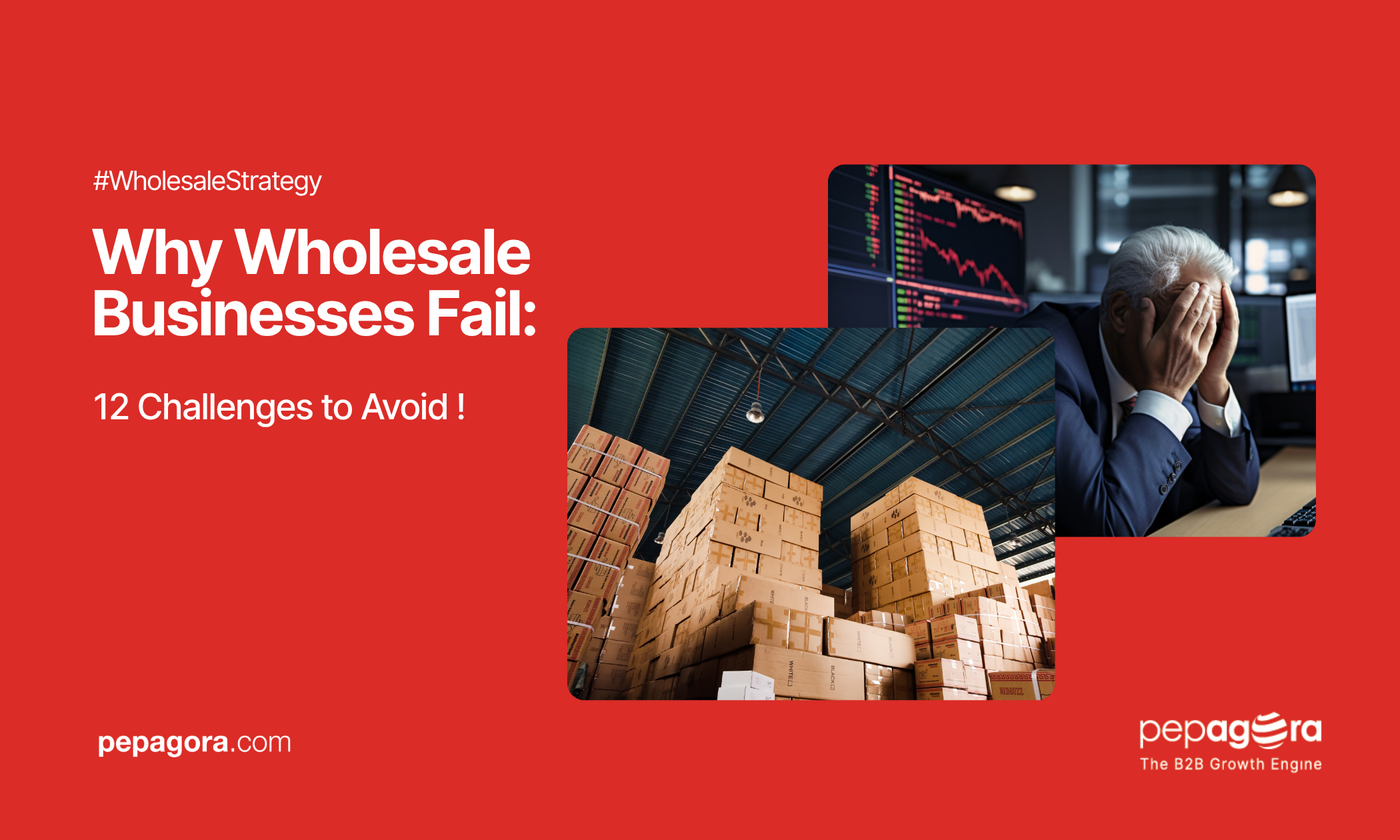
Why Wholesale Businesses Fail: 12 Challenges to Avoid
Wholesale isn’t easy. From pricing wars to supply chain struggles, we at Pepagora know the biggest challenges and how to fix them.
Are You Ready to Face the Real Problems?
Running a wholesale business can seem like a straightforward game buy in bulk, sell in bulk, and keep the margins healthy. But if it’s so simple, why do so many wholesale businesses struggle or even shut down?
The truth is, the challenges aren’t always visible on the surface. Many wholesalers fall into avoidable traps, often without realizing it until it’s too late. If you’re a wholesaler looking to build a strong, scalable, and lasting business, this guide is for you.
Check Here: In case, if you want to know how B2B marketplaces work?
Let’s explore the 12 common challenges that can break a wholesale business and more importantly, how to avoid them.
Poor Inventory Management
Inventory is the lifeline of any wholesale business. When not managed properly, it can disrupt the entire business flow. Overstocking locks up valuable capital and increases the risk of goods becoming obsolete. Understocking leads to lost sales and disappointed customers. Many businesses also rely on manual tracking, which leads to errors and confusion.
To avoid this, wholesalers must implement efficient inventory management systems.
Digital tools and software can offer real-time tracking, automate reorder levels, and help predict demand based on historical data. Keeping a balanced inventory helps maintain a healthy cash flow and customer satisfaction.
Inadequate Market Research
Understanding your market is not optional it’s critical. Many wholesalers jump into new product lines or industries without studying customer needs, market demand, or competitor behavior. This leads to poor sales performance and wasted investment.
Thorough market research involves identifying target customers, understanding buying trends, and analyzing what competitors are offering. Wholesalers should use data from online platforms, customer surveys, and trade reports to make informed decisions. The more you know about your market, the better positioned you are to serve it.
Weak Supplier Relationships
Your suppliers are key stakeholders in your business. If they fail, you fail. Unreliable suppliers can cause shipment delays, quality inconsistencies, or last-minute price changes all of which impact your business operations and credibility.
To prevent these issues, build strong, transparent relationships with your suppliers. Ensure contracts are clear, and always have a few backup suppliers for critical products. Regular communication and trust-building go a long way in creating reliable supply chains.
Outdated Pricing Strategies
In a competitive market, outdated or inflexible pricing can make you lose customers or profits. Many wholesalers stick to traditional markup models without considering current market conditions, customer expectations, or hidden costs such as logistics and taxes.
Review your pricing regularly to ensure it reflects both your costs and customer willingness to pay. Use competitor analysis and market insights to adjust pricing strategies. This helps you stay competitive while protecting your profit margins.
Lack of Online Presence
Today’s buyers search online before making a purchase. If your business has no digital footprint, you’re invisible to a large segment of potential customers. Having no website, no online catalog, and no presence on B2B marketplaces significantly reduces your reach.
Establishing an online presence is easier than ever. Platforms like Pepagora allow you to create a business profile, showcase your products, and connect with buyers globally. A digital presence improves credibility, builds trust, and opens doors to new opportunities.
Ignoring Digital Tools and Automation
Running a wholesale business with manual processes is inefficient and unsustainable. Managing orders, customer details, and leads through spreadsheets or paper records is time-consuming and error-prone.
Digital tools offer automation for order processing, inventory management, customer communication, and data analysis. A centralized platform, like Pepagora, integrates these functions, helping you manage operations smoothly and focus on growth.
Poor Customer Service and After-Sales Support
Customer experience doesn’t end after the sale. Wholesalers who neglect post-sale communication and support risk losing repeat business and gaining negative reviews. If a buyer encounters an issue and receives no response, they are unlikely to return.
Providing consistent communication, quick resolution of problems, and regular follow-ups builds long-term relationships. Excellent service encourages loyalty, increases referrals, and enhances your reputation.
Limited Cash Flow or Mismanaged Funds
Cash flow is often the silent killer of wholesale businesses. Large upfront investments in inventory, delayed payments from buyers, and unexpected expenses can quickly drain your resources.
To stay financially healthy, monitor your cash flow carefully. Avoid overextending on stock and have a buffer for seasonal slowdowns. Consider offering discounts for early payments and tighten credit terms with clients to ensure steady income.
Inefficient Order Fulfilment
When buyers place orders, they expect fast and accurate delivery. A lack of coordination in packing, shipping, and delivery processes leads to late or incorrect orders, damaging your reliability.
Set up structured fulfilment systems. Use order management tools to track each order from placement to delivery. Provide tracking updates to customers and aim for consistent delivery times. Efficient fulfilment builds trust and drives repeat business.
Weak Brand Identity
In a crowded market, your brand is what sets you apart. Many wholesalers ignore branding, thinking it’s only for retail. But without a strong brand, buyers won’t remember you.
Build a professional identity with a unique logo, consistent messaging, and a strong value proposition. Use platforms like Pepagora to showcase your story and what makes your business different. A clear brand identity builds recognition and loyalty.
No Differentiation from Competitors
If your offerings look and sound like every other wholesaler’s, buyers have no reason to choose you except for price. This leads to unhealthy price wars and low margins.
To stand out, add value. Offer customized solutions, bundle deals, flexible shipping, or exclusive products. Highlight these differentiators clearly in your marketing and on platforms like Pepagora.
Avoiding B2B Marketplaces
Some wholesalers resist joining B2B marketplaces, believing they don’t need help reaching buyers. But in doing so, they miss out on valuable opportunities for growth, visibility, and efficiency.
Pepagora offers a secure, verified space where suppliers can connect with global buyers, showcase products, receive inquiries, and access tools for growth. It’s a low-cost way to expand your market and operate more professionally.
How Pepagora Helps You Avoid These Mistakes
Pepagora.com is built for businesses like yours. We provides the tools and visibility you need to thrive in today’s competitive market. Whether you’re struggling with lead generation, product showcasing, or finding reliable partners, manufacturers or suppliers, Pepagora has solutions:
- Build a professional catalogue quickly
- List products and special offers
- Access a centralized dashboard for analytics
- Manage inquiries and RFQs easily
- Reach global markets with verified trust
By joining Pepagora, you’re not just listing products you’re building a complete growth strategy for your wholesale business.
Final Thoughts: Don’t Let These Challenges Hold You Back
Every business faces obstacles, but the key is knowing which ones to watch for and having the right tools to overcome them. Whether it’s managing inventory smarter, refining your pricing, or establishing a stronger digital presence, small changes can make a big difference.
Pepagora empowers you to identify and fix these gaps, helping you build a business that is resilient, scalable, and visible to the world. Don’t wait until challenges bring your business down. Take control, avoid common mistakes, and grow with confidence.


